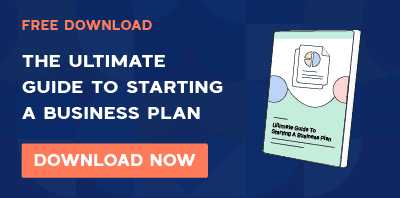Despite endless online resources, people still search for and buy business plan books. That would be you and me, my friend. Because books offer something the internet often doesn’t—structured, credible, distraction-free learning.
Moreover, thanks to the information overload on the internet, credibility is hard to spot. Books by founders, investors, or professors carry vetted, experience-based insights and not recycled content or clickbait.
Lastly, do I even need to mention that people still equate published books with authority, especially when pitching to investors or lenders?
That’s why I’ve listed in this post my top business planning books that truly deliver.
Each book has its own approach, focus, and rhythm. Some guide you step by step through the planning process, while a few show you how to make your plan actionable.
Full transparency: How I picked these books
I’m Kaylee Philbrick, and I’ve spent over a decade helping entrepreneurs write and refine their business plans. Every book on this list is based on my personal reading and hands-on consulting experience. None of these recommendations are sponsored or affiliated; they’re simply the ones I’ve seen make a real difference for founders learning to plan, forecast, and execute better.
My shortlist: 7 Business plan books worth your shelf space
There are numerous books available on business planning, and choosing one from many can make things confusing. Isn’t it? Thus, I’ve listed 7 best business planning books from my first-hand reading experience that show you what matters, what to focus on, and how to take action.
Let’s dive in:
1) The Secrets of Writing A Winning Business Plan

| Field | Details |
|---|---|
| Author | Hal Shelton |
| Ratings | 4.4/5 (Amazon) |
| Best For |
|
| What’s Inside |
|
| Price (approx.) | $17.99 |
| Number of Pages | 320 |
I recommend this book if you’re struggling to figure out exactly how to convert a business idea into an actionable plan. It walks you through a step-by-step process of crafting a business plan with proven strategies.
Moreover, this book breaks down every part of a business plan, showing:
- What to include
- How to structure your ideas?
- How to make an investor-ready plan without guesswork?
When I read it first, I realized how many founders waste time guessing what investors want, and this book shows you exactly how to avoid that.
Remember, the author Hal Shelton is not just an author; he was the CFO of a NYSE-listed company and has spent decades mentoring small business owners. Thus, the advice in this book isn’t just theoretical; it comes from someone who’s been in the trenches and seen what works in the real world.
2) Anatomy of a Business Plan
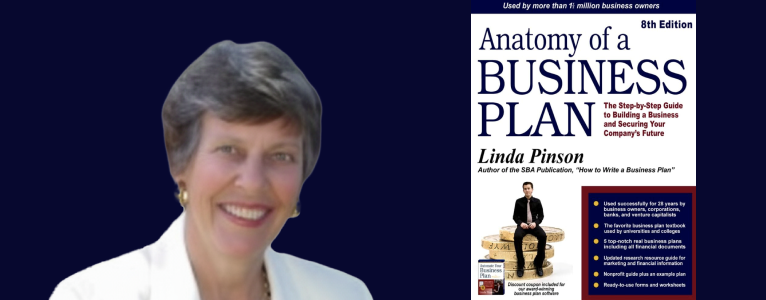
| Field | Details |
|---|---|
| Author | Linda Pinson |
| Ratings | 4.2/5 (Amazon) |
| Best For |
|
| What’s Inside |
|
| Price (approx.) | $19.98 |
| Number of Pages | 364 |
When I first came across this book, it wasn’t through some big recommendation list; it was actually suggested by one of my early clients who struggled to organize their plan.
He told me, “This book feels like a workbook more than a textbook,” and I got curious enough to pick it up.
The book is all about breaking down a business plan into manageable pieces. Pinson walks you through every section, from executive summary to marketing plan to financial statements, using worksheets and real-world examples.
It’s structured in a way that makes planning less intimidating, especially if you’ve never done it before. What I personally found valuable is how actionable it is. It’s not theory-heavy; it shows you:
- How to present your business plan to investors or lenders
- Packaging and developing of each section
- Step-by-step guidance on creating realistic financial projections
Linda Pinson is recognized nationally for her expertise in business planning, so she understands exactly what a first-time business plan writer will feel. That’s why she includes real-life business plan examples throughout the book.
These examples bridge the gap between theory and practice, showing you how each section should flow and what investors actually expect.
3) The One-Page Business Plan
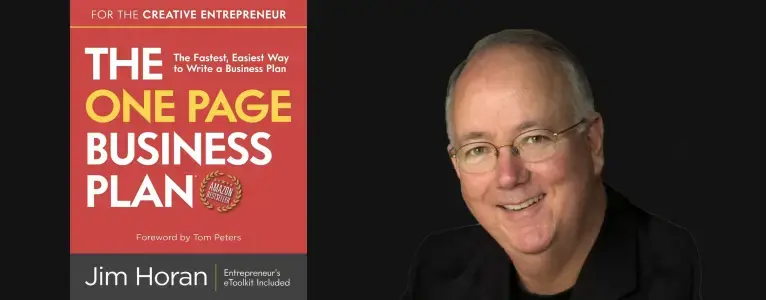
| Field | Details |
|---|---|
| Author | Jim Horan |
| Ratings | 4.2/5 (Amazon) |
| Best For |
|
| What’s Inside |
|
| Price (approx.) | Around $25–$35 |
| Pages | 112 |
As the name suggests, The One-Page Business Plan isn’t like a traditional 20–30 page business plan guide. It’s a practical, quick, and logical book that guides you through a highly focused one-page business plan.
If you need a concise draft quickly, say, for an urgent investor meeting, this book is helpful. Jim Horan breaks down your entire business into a single page, showing how to capture your vision, goals, strategies, and key numbers within a page.
This approach makes preparing your first draft much easier and gives you the confidence to move forward with your plan quickly.
What I personally liked is how it forces clarity. You’re not just filling in sections; you’re thinking critically about what matters most, which keeps your business focused. The practical examples and worksheets make it actionable, so you can draft a usable plan fast.
Features of The One Page Business Plan:
- Includes worksheets and examples to draft your plan quickly
- Helps you identify and highlight the most important goals and numbers
- Enables you to produce a usable plan in just a few hours
- Condenses your entire business plan into a single, easy-to-read page
4) The Business Plan Workbook
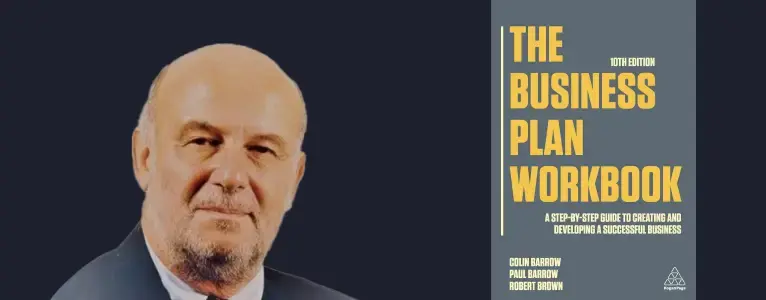
| Field | Details |
|---|---|
| Author | Colin Barrow, Paul Barrow & Robert Brown |
| Ratings | 4.4/5 (Amazon) |
| Best For |
|
| What’s Inside |
|
| Price (approx.) | Around $30–35 |
| Pages | 416 |
I’ve read a lot of business planning books over the years, and most of them teach you what a business plan should look like. However, The Business Plan Workbook does something different; it actually prompts you to start building one as you read.
It’s not a typical business plan writing book, but a practical guide that runs through:
- 26 key areas of strategic planning
- Practical research on the market and competition
- Realistic operation and staffing plans
- Reliable forecasts and projections
- Ultimate guide to pitch investors and bankers
Thus, this book is a comprehensive package; it doesn’t stop at the business planning process but also helps with creating a pitch deck. It also comes with student-friendly case studies that show how classroom concepts play out in real businesses.
Overall, if you’re planning to launch a business, refine an existing plan, or teach someone how to structure their ideas effectively, this workbook gives you a hands-on approach.
5) Writing Winning Business Plans

| Field | Details |
|---|---|
| Author | Garrett Sutton |
| Ratings | 4.7/5 (Amazon) |
| Best For |
|
| What’s Inside |
|
| Price (approx.) | Around $18–$22 |
| Pages | 210 |
When I first picked up Writing Winning Business Plans, I thought, “Ah, just another business plan guide.” But as I read on, I realized it was completely different. Sutton isn’t just showing you how to write a plan; he’s showing you how to use it as a tool to win.
This book teaches you how to make it work for you, whether that’s winning a contest, impressing an investor, launching a new product, or entering a new market.
Importantly, Sutton’s approach makes your plan so compelling that anyone reading it will want to turn every page. Such an approach gives you the power to actually achieve results in the real world.
The concept is simple: Write a plan that helps you win. That’s what sets this book apart from every other business planning guide on the shelf.
It’s not theory; it’s practical, actionable, and designed to give you an edge in every opportunity you pursue.
Here are the features of the Writing Winning Business Plan book:
- Business plan elements that attract funding
- Hooks and holds that make investors want to keep reading
- Strategies to prepare a winning plan for businesses, and especially real estate ventures
- Process to build a plan to enter the business and win a lucrative contest
6) The Plan-As-You-Go Business Plan
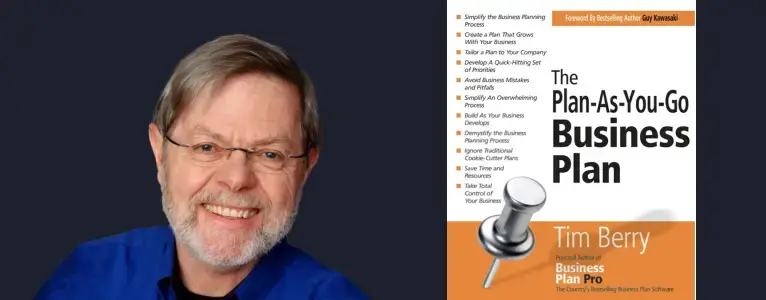
| Field | Details |
|---|---|
| Author | Tim Berry |
| Ratings | 4.3/5 (Amazon) |
| Best For | Entrepreneurs and small business owners who want a flexible and evolving plan |
| What’s Inside |
|
| Price (approx.) | Around $20–25 |
| Pages | 270 |
The book Plan-As-You-Go changes the traditional approach of writing a business plan completely. If you’re running a business or planning to start lean, this book is a must-read—I’m confident it will give you practical guidance you can actually use.
The author Tim Berry tells you upfront, you don’t have to draft a perfect, cookie-cutter plan before you even start. Instead, the book teaches you to build your plan as your business grows, giving guidance for every situation and stage.
This approach trains you to ignore rigid, formal templates and focus on what truly matters for your company. You can start small, adjust as you go, and steer your business forward without wasting time on sections that don’t apply yet.
What makes this book different from others is its:
- Focuses on planning as you go, not following rigid, traditional steps.
- Helps you focus only on what matters now, avoiding unnecessary work.
- Provides tailored advice for various business stages and situations.
- Offers exercises and examples you can apply immediately to your own business.
7) The 1-Page Marketing Plan
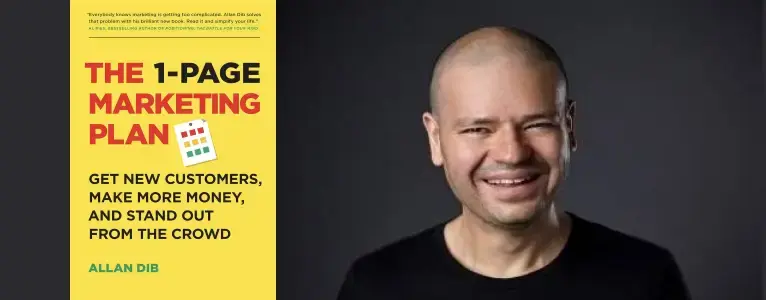
| Field | Details |
|---|---|
| Author | Allan Dib |
| Ratings | 4.7/5 (Amazon) |
| Best For |
|
| What’s Inside | Step-by-step process to map out marketing in one page, lead generation strategies, sales conversion tactics, customer retention framework, and practical worksheets with examples |
| Price (approx.) | Around $15–20 |
| Pages | 234 |
If you’ve ever felt marketing is complicated or overwhelming, this book will change your mind.
The 1-Page Marketing Plan is built on a simple idea—your entire marketing strategy can fit on one page. Allan Dib breaks it into nine squares that guide you step by step:
- Choosing your target market
- Crafting your message
- Generating leads
- Converting sales
- Building customer loyalty
What makes this book powerful is its simplicity. You’re not stuck with theory or long documents you’ll never use. Instead, you walk away with a clear, actionable plan you can apply immediately to grow sales and make your business more profitable.
The real value? It helps you stop guessing. By the time you finish, you’ll know exactly who you’re speaking to, how to reach them, and how to keep them coming back. That clarity is what makes this book stand out.
What’s next?
Pick the book or approach that fits your business needs and take the first step on your journey. I know it can feel overwhelming at the start, but trust me; when you do it properly and see the results, it feels as sweet as honey.
And the best part? If you ever get stuck while building your business plan, Upmetrics has your back. Just answer a few simple questions, and the platform helps you craft entire sections in minutes.
So be brave, start today, and take one step closer to the business and the future you’ve been dreaming of.


